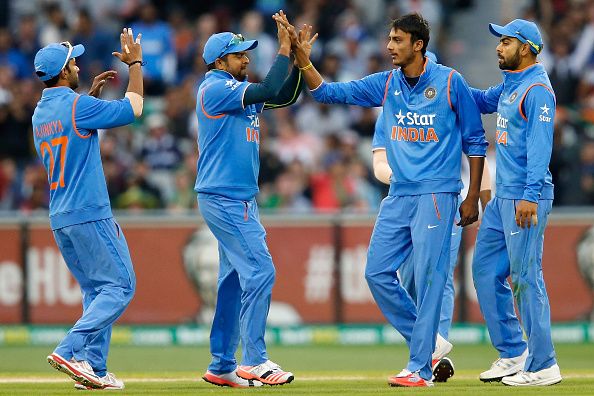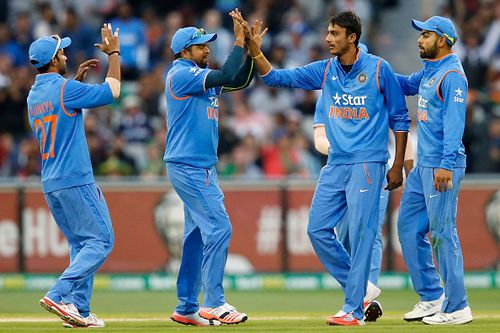
Why India need not fear the prospect of playing at Perth

There was a time when the very mention of Perth used to unnerve batsmen - even Australians, who are used to playing against pace and bounce from a young age, used to be terrified at the prospect of facing the fearsome West Indies pacers. However, the Western Australian Cricket Association (WACA) Ground, like many others in the world, has lost some of its viciousness in recent years.
The Indians will have their first taste of WACA on this tour when they take on England on Friday in a virtual semi-final of the ODI tri-series. Thanks to rain washing out their game against Australia in Sydney, India got a life-saving two points. All they now need is to beat England, who have five points from three matches. India lost to Australia and England in their first two games.
If the Indians had lost to the Australians on Monday, they would have been on calculators the entire Friday, calculating the run rate or the number of overs required to bowl England out.
More than the tri-series, the Indians will be happy to get a feel of the WACA as they will be playing two group stage games of the World Cup there - against the United Arab Emirates on February 28 and then the West Indies on March 6.
More than the pitch at the WACA, the Indians are more worried about getting eleven fit men in time for the World Cup. They can't be going in as defending champions with two of their key players - if not three - nursing injuries.
Ravindra Jadeja has not played any cricket for over two months while Ishant Sharma has been out injured for three weeks. Both would have played in Sydney and so should be there on Friday. Rohit Sharma's hamstring is on the mend, but the think tank would not like to risk him either on Friday or in Sunday's final if India make it.
There can't be a luckier guy than Shikhar Dhawan. The opener from Delhi is getting chance after chance because there is no reserve batsman in the squad; Ambati Rayudu has already been slotted in at No.3 in the batting order in place of the injured Rohit.
As if these vexed problems are not enough, the team management is undecided whether the team's best batsman Virat Kohli should bat at No.3 or No.4. The argument for him batting at No.4 is that he could hold the wobbly middle-order together, but then the failure of the top order in the first two games has meant that he has had to walk in at a precarious position with two wickets down for almost nothing.
A similar situation had arisen ahead of the 2007 World Cup when Sachin Tendulkar had to, much against his wishes, bat at No.4 with Virender Sehwag, Sourav Ganguly and Robin Uthappa occupying the top three slots. India exited in the first stage itself.
This shifting of Tendulkar "in the interest of the team" was one of the reasons leading to a rift between Tendulkar and coach Greg Chappell. After that Tendulkar was restored to the opening slot, saying that the team's best batsman should get to play the maximum overs.
If that's the case, Kohli should open the innings as he will get to bat 50 overs unless someone pipes up to say that would unsettle the entire batting.
India’s past performances in Perth encouraging
As for the WACA pitch, the Indians can take heart from history. On the 2008 tour, India won the Test by 72 runs, with the pace of RP Singh, Ishant Sharma and Irfan Pathan proving good enough to rattle the Australians. And the batsmen stood up to the hostile pace and swing of Brett Lee, Mitchell Johnson and Shaun Tait.
Also, in the 1991-92 tri-series involving India, Australia and West Indies ahead of the World Cup, India tied with the West Indies in a low-scoring game at the WACA, with both teams struggling to get to 126.
Two days later, India walloped Australia by 107 runs at the same venue, courtesy of Ravi Shastri, the current team director, claiming five wickets for 15 runs. He then should know a bit about the Perth wicket.
India may not have the luxury of going in with five or even six bowlers today like they did a couple of times in the past. In one classic game at the Gabba in 2000, Pakistan had Wasim Akram, Waqar Younis, Shoaib Akhtar, Abdul Razzaq, Saqlain Mushtaq and Shahid Afridi while India fielded Srinath, Venkatesh Prasad, Ajit Agarkar, Ganguly and Robin Singh to share the new ball and Anil Kumble to tighten things with spin. If needed, skipper Tendulkar could also have turned his arm over.
In that series, Pakistan's firepower proved too much for India at the Gabba, Hobart and Perth. India could only beat them at Adelaide where Kumble was at his best.
The era of bits-and-pieces players coming to the party is over with the new field restrictions where even the specialist bowlers are unable to bowl six tight deliveries. The days of Gangulys, Prabhakars and Agarkars doubling up are over; specialists will have to do well if the team has to win.
And the WACA pitch is not what it used to be.